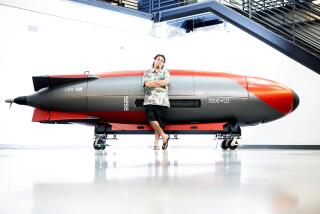A new rival to venture capitalists
SAN FRANCISCO — The Young Turks who made their mark as early backers of Facebook Inc. have raised a second investment round more than four times as large as their first, signaling their growing clout as an alternative to venture capitalists on Silicon Valley’s Sand Hill Road.
Founders Fund Management, led by a quartet of wealthy and connected entrepreneurs behind such success stories as online payment service PayPal Inc., said Monday that it had raised $220 million from institutional investors to pump into new companies.
Though not a huge sum by Silicon Valley standards, the investment round confirms that the financial world is paying attention to the San Francisco firm.
“This is not like 1999 or 2000. Today the market is far more discriminating. You need a compelling story to raise money,” said Paul Gompers, a Harvard Business School professor and an investor in Founders Fund. “This is a sign that the market has looked for the key differentiation that makes a new group like Founders Fund successful in what is a very competitive market.”
One of Founders Fund’s major selling points with institutional investors is its connection to a powerful network of former PayPal executives who have founded or invested in dozens of start-ups with an aggregate value of about $30 billion. And entrepreneurs like the firm’s investment philosophy, which strives to give start-up founders more influence and stake in their own ventures.
Its first round of deals included Slide.com, the San Francisco photo and video sharing site PayPal co-founder Max Levchin started in 2005, and Geni Inc., a Los Angeles-based genealogy site that former PayPal executive and Hollywood producer David Sacks started in 2006.
Founders Fund was started in 2005 by PayPal co-founder Peter Thiel, who in the last five years has turned his $60-million payout from EBay Inc.’s acquisition of PayPal into a finance powerhouse.
He runs hedge fund Clarium Capital Management and Founders Fund from the complex in San Francisco’s Presidio neighborhood that lodges George Lucas’ movie empire.
The firm has developed a reputation for making hot investments, in part because of the $500,000 Thiel sank into popular social networking site Facebook. His stake is now estimated to be worth roughly $1 billion.
“Ten years ago, everybody dreamed of having a star venture capitalist on their board,” technology forecaster Paul Saffo said. “Now they are dreaming of having star entrepreneurs on their board.”
Thiel and three fellow managing partners -- Ken Howery, Luke Nosek and Sean Parker, all of whom personally experienced the highs and lows of starting and running their own companies before joining Founders Fund -- say they are trying to bring back a key element of Silicon Valley’s early days: veteran entrepreneurs, not professional money managers, seeding new ventures.
The managing partners say that approach better aligns the interests of investors and entrepreneurs.
They are trying to do away with the love-hate relationship between entrepreneurs and venture capitalists who offer capital and connections in exchange for big stakes that give them power over businesses decisions.
For example, Founders Fund helps start-ups create a new type of stock that lets founders cash out a small percentage of their stake in a funding round so they don’t have to wait until the company is sold or goes public to make money. That way, Howery said, they are more likely to reject low-ball buyout offers, the way PayPal did -- with first Yahoo Inc., then several times with EBay before finally selling to the online auction house for $1.5 billion.
That’s something even repeat entrepreneurs appreciate.
“When you take money from an investor, you expect it to be the beginning of a long relationship,” said Konrad Feldman, chief executive of San Francisco Web analytics firm Quantcast. “It’s important that everyone’s expectations and interests are aligned.”
“Founder friendly” is a clever marketing ploy, but what wins deals is Founders Fund’s track record, said University of Chicago Graduate School of Business professor Steve Kaplan.
The managing partners raised their first $50-million fund in 2005 from wealthy individuals and their own pockets.
They are investing it in 23 companies, two of which have been sold, netting tens of millions of dollars.
The companies sold, both security firms, were IronPort Systems Inc. to Cisco Systems Inc. and CipherTrust Inc. to Secure Computing Corp.
This time, Founders Fund went after foundations, universities and endowments, the life blood of the blue-blood venture firms.
The firm declined to disclose investors’ names or discuss returns of the first fund.






